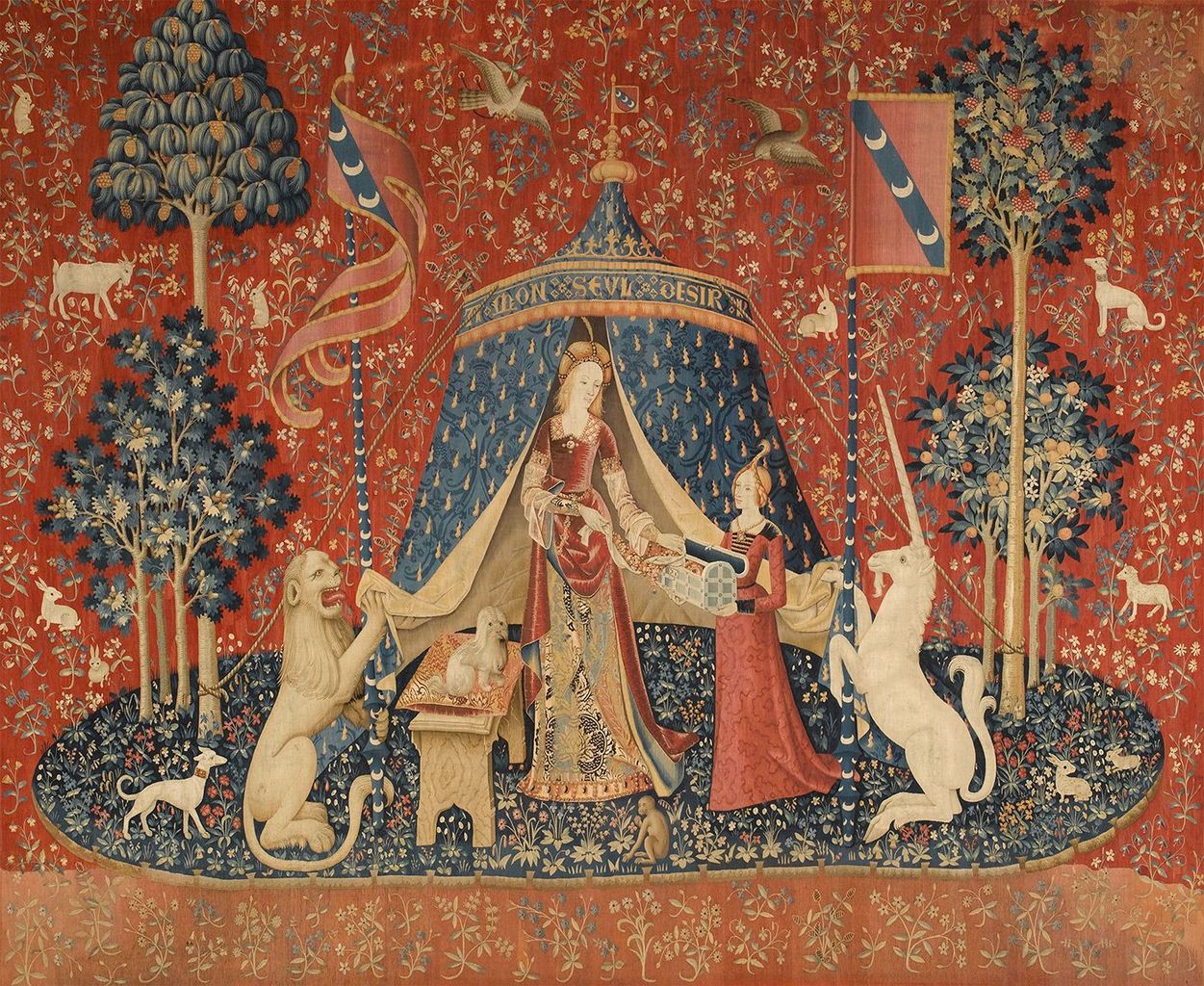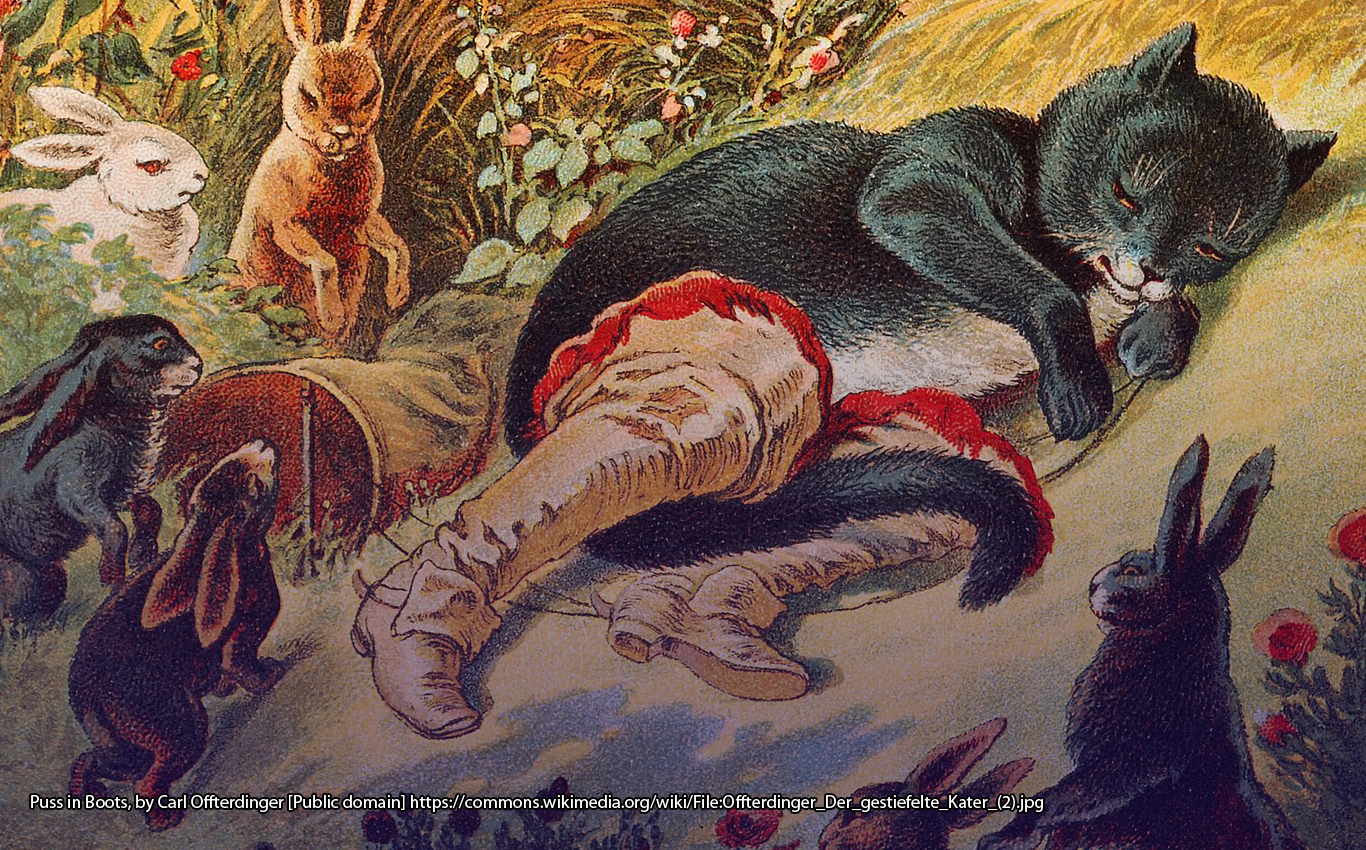This is the story of the legendary Aurelius Ambrosius, a King of the Britons in the 5th century AD. According to some medieval writers such as Geoffrey of Monmouth, he was the uncle of the famous King Arthur, who would later take the crown. Most accounts say he was a modest, just, and determined man who exercised self-discipline in all of his ways. He was a skilled warrior both on horseback and on the ground; an inspiring leader of men and an outstanding military tactician and general. Aurelius harboured a burning hatred for King Vortigern, who had usurped the crown of the Britons from his family. Vortigern had, however, been betrayed by his Saxon allies, resulting in the deaths of many of the ruling Britons in an incident known as “The Treachery of the Long Knives.” With the Britons defeated and under Saxon tyranny, Aurelius Ambrosius with his brother Uther returned to free their countrymen and reclaim the crown of the Britons. Presented here and drawn from several sources listed below is the story of how Aurelius defeated Vortigern and the Saxons led by Hengist to become King of the Britons, restore law and order, and begin the process of rebuilding a wounded and shattered nation.
The Burning of Vortigern
While the Saxon takeover of Britain was unfolding, in exile, Aurelius Ambrosius was making a name for himself in the battles of Armorica, and his fame spread across Europe. Finally, after meticulous preparation, he arrived on the shores of Britain at Totnes with his younger brother Uther, at the head of a powerful invasion force of Armorican cavalry and footmen. Word of the coming of Aurelius and his brother spread rapidly across Britain. The few war leaders and nobles that were left after ‘The Treachery of the Long Knives‘ had been scattered and leaderless, but were now united under the banner of Aurelius, burning for vengeance. They came together from all parts of Britain to join with him and brought together the clergy, who anointed him the King of the Britons.

The Britons wanted to attack Hengist immediately but Aurelius overruled them. Instead he was intent on first wreaking vengeance on Vortigern, and led the Britons to his last stronghold. Aurelius was joined by Eldol, the Duke of Gloucester, the only British noble of those present, apart from Vortigern, to have survived ‘The Treachery of the Long Knives‘. Once his army had taken up their positions, Aurelius gave the command for the great siege engines to set to work. Though these laboured long and hard, they could not break through the walls. After all attempts had failed, Aurelius gave the order to burn the tower. Ordering wood to be piled around it and set on fire, his archers fired burning arrows into the stronghold, where they found plenty of fuel. There was no escape for Vortigern: along with his wives and followers, he perished in the flames.
The Return of Aurelius Ambrosius
The arrival of Aurelius Ambrosius to take the throne of the King of the Britons put fear into the hearts of Hengist and his Saxons, who was well aware of his reputation. Hengist knew full well that, being the rightful heir to the throne of Britain, Aurelius had right on his side. He also knew all about his prowess as a warrior and military strategist and he feared Aurelius above all his other enemies.
As Aurelius made his way north, Hengist realised he had to fight. He urged his warriors not to fear Aurelius, telling them his Armorican horsemen were few and that the army of the Britons numbered less than ten thousand, while pointing to their own superiority in numbers. Having greatly motivated his men, Hengist set them in battle formation at a place he knew Aurelius would have to pass through, thinking to catch him by surprise and unprepared. Aurelius anticipated this however, and instead of being caught out, marched his men with more vigour to meet the Saxons and provoke open conflict. He gave each regiment their orders and would himself lead the Armorican cavalry into a frontal attack on the Saxon line.
For Eldol, the Duke of Gloucester, this was the moment he had been waiting for. Ever since the mass murder of the British nobility, he had been hoping to engage Hengist in single combat where there would only be one winner. All of the Britons in that battle had scores to settle. They were determined to avenge the wrongs done to their homeland by the Saxons — who were still a formidable and dangerous fighting force — and drive them out of their country. The scene was set for a grim and bloody battle for supremacy, with the prize being the control of the island of Britain.
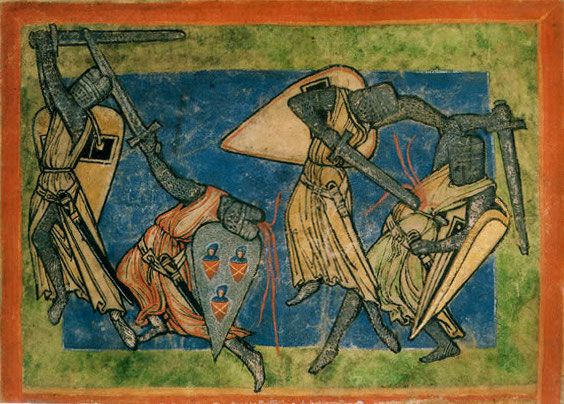
Hengist and the Saxons
At last Britons and Saxons faced each other and the battle began. Both sides committed themselves with undeniable bravery and ferocity, with Aurelius Ambrosius motivating the Britons and Armoricans, and Hengist urging on his Saxon warriors. As the battle raged, Eldol scoured the battlefield, hoping for a chance to engage with Hengist man-to-man, but the fighting was so fast and furious he had no opportunity. When Hengist realised his Saxons were being routed and the Britons and their allies had the advantage, he fled, heading for the town of Kaerconan, (known today as Conisbrough) with Aurelius Ambrosius hard on his heels.
However, Hengist resisted the temptation to use the town as a sanctuary, fearing he would be besieged and trapped with no escape. Therefore, still having a formidable force of fighting men, he decided to make a stand outside the town, hoping to either defeat the Britons and their allies in open battle or break free.
The Britons were soon upon them, and there began a most fierce and terrible fight. Although the Britons fought ferociously, the Saxons would not give ground, and great numbers were killed or wounded on both sides. The screams of the wounded and dying further enraged the men still standing, and the Saxons began to gain the day. Seeing this, Aurelius sent in horsemen from the Armorican Britons as he had done in the previous battle. Their arrival forced the Saxons back, splitting their ranks and preventing them from uniting their forces. Seeing this, the Britons exerted themselves harder and with greater fury and vitality. Aurelius was ever at the forefront of the battle, driving hard against the Saxons and forcing them to retreat before him. He killed all who stood in his way and his example gave great encouragement and energy to the Britons, who had long suffered at the hands of the Saxons.
The Vengeance of Eldol
Another Briton performing heroics on the field was Eldol, the Duke of Gloucester. Always in the thickest and most furious part of the battle, bringing death and destruction to the Saxons wherever he went, Eldol continued to seek out his archenemy, Hengist. As the battle raged he engaged Hengist in a deadly duel: Eldol eventually won, taking his opponent alive to face the justice of Aurelius Ambrosius, the King of the Britons.
With Hengist captured alive, the Britons redoubled their effort, driving hard against the Saxons. Although dismayed at the loss of their great war leader, the Saxons, in turn, still fought on. Although the battle continued to ebb and flow, the loss of Hengist and his leadership were sorely felt, and the Saxons began to give ground. Relentlessly, the Britons continued the assault, and despite their courage the Saxons were forced to flee the battlefield. Some took to the woods, some to the hills, others made for the cities while others tried to get to the harbours on the coast where their ships were anchored. Octa, son of Hengist, decided to make for the cities, leading a strong contingent of Saxons to York, while his kinsman Eosa led a great number of Saxon survivors to another city where he had a large bodyguard of men stationed.
With the battle won and Hengist taken, Aurelius rested his army and held a council of his leaders to decide what to do with Hengist. Eldad, the Bishop of Gloucester, and the brother of Eldad called for the execution of Hengist. This was agreed: Aurelius gave the order and Eldol carried it out, decapitating Hengist and at last fulfilling his quest for vengeance.
With Hengist dead, Aurelius marched his army to York, intending to confront and besiege Octa. On seeing the size of the army of the Britons, Octa doubted the city could withstand siege or direct attack. Seeing no other choice, Octa surrendered to Aurelius and begged his clemency. Again Aurelius held a council to decide the fate of the Saxons. Eldad again spoke up, but this time called upon Aurelius to show mercy, which was granted. On hearing of the King’s mercy, Eosa also came to Aurelius begging clemency. Again it was given and a covenant was made: under it, the Saxons were allowed to inhabit the lands that bordered Scotland on condition that they obeyed the King of the Britons, lay down their arms, and lived in peace.
The Rebuilding of Britain
With his enemies defeated, the King of the Britons summoned all of his lords, nobles, and the clergy to York, where he gave orders for the rebuilding of the country in the ways of the Britons. Aurelius ordered that all churches destroyed or damaged by the Saxons should be restored, and he himself undertook the restoration of York Cathedral and the other cathedrals in the province. After fifteen days, the work was underway and Aurelius travelled to London to see what damage had been done there. All along the way he was sorry to see the destruction the Saxons had inflicted upon the country. His next act was to bring back the old laws, and to begin putting in order the affairs of the country. Aurelius gave those lands that had been taken by the Saxons back to their rightful owners and where there were no longer heirs to estates, he shared these out among his soldiers. So it was that the king soon had the restoration of his kingdom underway, and justice, peace, and the rule of law and justice were firmly established once again over the Britons.
From London, Aurelius travelled to Winchester, viewing how the restorations were going along his way. He then went to Kaercaradoc, (known now as Salisbury) to the monastery of Bishop Eldad. It was here that the terrible massacre of Britain’s leading nobles had been carried out by Hengist during ‘The Treachery of the Long Knives‘, and the place where the victims had been buried.
The monastery was situated on the mythical mountain of Ambrius, named after its founder, and now maintained by three hundred monks. Aurelius was deeply affected by the burial ground and the memory it held and began to think about what kind of a monument should be built to honour the victims and perpetuate the memory of the Saxon treachery.
The Giant’s Dance
All of his best artisans and craftsmen in wood and stone could not give Aurelius a satisfactory design for a monument of sufficient stature. At last, the Bishop of the City of the Legions stood up and proposed that he seek out Merlin, the man who had previously advised Vortigern concerning his failed attempt to build a stronghold on Dinas Emrys. Merlin had made the prophecies of the two dragons, the arrival of Aurelius and Uther, and foretold the deaths of Vortigern and Hengist: if anyone knew of a fitting monument it would surely be him.
When Merlin arrived he told the King of the stone circle in Ireland on Mount Killaraus that was known as the Giant’s Dance, telling him they had carried the huge stones from Africa to create it. Merlin told Aurelius that if they were transported from Ireland and erected at Ambrosius exactly as they had been on Killaraus then they would stand for ever and be a most fitting monument to the victims of the treachery.
At first Aurelius was sceptical, thinking that it would be impossible to uproot such great stones and move them across the sea, pointing out that there were plenty of stones more easily available in Britain. However, Merlin was adamant that only these stones would do as they had been carried from Africa to Ireland by giants of old and that each one had special medicinal properties. He told Aurelius he, Merlin, alone had the knowledge and art to move them, and emphasized that there was nothing that could be used in their stead.
Aurelius and all those present grew serious and discussed Merlin’s proposal. It was decided that Uther would lead an army of fifteen thousand men to procure the stones by any means. Merlin was to accompany Uther as his adviser and to direct the moving of the stones from the mythical Mount Killaraus in Ireland back across the sea to the island of Britain, to be set up again at Ambrius around the graves of the fallen. Uther and Merlin embarked on their task to bring back the stones from Ireland. On hearing of the arrival of the Britons and their intention to take the stones, Gillomanius, the King of Ireland, decided to defend them, forcing Uther to engage him in a battle, which the Britons won. Under the supervision of Merlin, the stones were taken up and moved to the ships with incredible ease and transported across the sea to Britain. On their arrival, Merlin then supervised their removal and transport to the prepared site on Ambrius.
![Stonehenge by Jasper Francis Cropsey [Public domain or CC0], Source Stonehenge by Jasper Francis Cropsey, 1876 - Nelson-Atkins Museum of Art - DSC09199.JPG](https://folklorethursday.com/wp-content/uploads/2018/02/Image-4.jpg)
The Death of King Aurelius Ambrosius
Vortigern had a third son named Pascentius. With the victories of Aurelius over Hengist and Vortigern, Pascentius had fled to Germany to try and raise new forces to avenge the death of his father. He promised huge amounts of silver and gold to any who would follow him in his attempt to invade and control Britain. Seeing vast riches to be gained, many took up the challenge, and soon he had under construction a huge fleet of ships to carry a new army to attack Britain and avenge his father against Aurelius and Uther. Arriving in the northern part of Britain he immediately began destroying all in his path.
On receiving this news, Aurelius mobilized his army; meeting Pascentius in battle he defeated him, forcing him to flee for his life. Pascentius could not return to Germany after this disastrous defeat so he set sail for Ireland where he was received by King Gillomanius who had no love for the Britons after the theft of the Giant’s Dance. The Irish King listened to Pascentius sympathetically and the two decided to join forces against Aurelius. They mustered their forces and made ready a fleet to sail to Britain landing at Menevia, now called Swansea.
Disease and pestilence have no respect for kings or the mighty and it so happened that Aurelius had been taken ill and lay in his sickbed in Winchester. Uther, his younger brother, on hearing of the arrival of the enemy fleet, promptly mustered the King’s forces for the defence of the realm. Marching to meet the invader, he took Merlin to advise him. Meanwhile, Pascentius and Gillomanius had heard that King Aurelius Ambrosius was incapacitated in his sickbed and rejoiced, thinking this would aid their conquest greatly.
One of the Saxons by the name of Eopa went to Pascentius with an evil proposal and asked him what reward he would receive for killing Aurelius Ambrosius. Pascentius told him he would reward him with one thousand pounds of silver and his lifelong friendship and make him a commander in his army. Then Eopa told him of his plan, explaining that he spoke and understood the language of the Britons and that he would disguise himself as a Christian monk of the Britons, practicing the healing arts. He would go to Winchester and seek to attend and cure Aurelius with a potion, but that potion would instead be slow acting poison, giving him time to escape. Delighted, Pascentius struck a deal with him and agreed to the plan.
On arrival, Eopa immediately made himself known as a healer and physician and offered his services to the king, who gratefully received him in the hope of being cured. Eopa promised Aurelius that his potions would quickly restore him to full health but he must follow all instructions that he would give. Aurelius, in his innocence and desperation, readily assented, and took a mixture Eopa had prepared that had been secretly laced with poison.
Obediently Aurelius drank it down and then Eopa told him to cover himself over and go to sleep. In this way the poison coursed slowly but surely through the King’s veins, killing him in his sleep. This gave Eopa plenty of time to make his escape before the death of the King was realised. When servants went to see the King they found him dead, and on searching for his physician found he had disappeared and could not be found.
Merlin’s Prophecy
As Uther marched the army of the Britons to confront the invaders, there appeared in the sky a most bright star that shone both day and night. From one of its rays their burst a beam of light that took the shape of a fiery dragon, and from its mouth two shafts of light burst forth. Uther called on Merlin to explain this celestial phenomenon. Sadly, Merlin told him it signified the death of King Aurelius Ambrosius and foretold that he would defeat the enemy and succeed him as King of the Britons. Merlin was to be proved right and soon after the victory a messenger arrived from Winchester telling of the death of the King and of his burial inside the Giant’s Dance, which seemed a fitting place for him to rest. His funeral had been conducted by the highest clergy and with all royal ceremony. Uther was made King of the Britons and took the name Uther Pendragon after the celestial spectacle, and would go on to fulfil Merlin’s prophecy. The rule of Aurelius Ambrosius had rid the Britons of the usurper Vortigern, who many saw as being a weak, corrupt, and foolish man, blaming him for bringing over the Saxons who so violently betrayed him. With Vortigern dealt with, he then removed the threat of the Saxons and subdued the Picts. He brought peace and stability and returned the country to the law of the Britons of the island of Britain.
To read all the articles in this series, visit the British Legends Series page or select from the list below:
- British Legends: The Quest for the Holy Grail
- British Legends: The Founding of Britain: Brutus of Troy and the Prophecy of Diana
- British Legends: The Mabinogion – The Dream of Macsen Wledig
- British Legends: Gogmagog and the Giants of Albion
- British Legends: Treachery, Murder, Lust and Rowena: The Rule of Vortigern
- British Legends: The Origin of Albion and the Bloodlust of Albina and Her Sisters
- British Legends: The Lust of Uther Pendragon, Merlin’s Prophecy and the Making of a King
- British Legends: Aurelius Ambrosius, Legendary King of the Britons
- British Legends: Elen of the Hosts – Saint, Warrior Queen, Goddess of Sovereignty
- British Legends: Beowulf and the Great Flame Dragon
- British Legends: The Divine Tragedy of Guinevere
- British Legends: The Tragic Romance of Tristan and Isolde
- British Legends: Morgan le Fay – Magical Healer or Renegade Witch?
- British Legends: The Madness of Merlin (Part 1)
- British Legends: The Madness of Merlin (Part 2)
- British Legends: Warrior Women — The Battle of Britomart and Radigund the Amazon Queen
- Mythical Beasts: The Griffin, the Legendary King of All Creatures
- British Legends: King Lear and Cordelia – A Tale of Love and Foolishness
- British Legends: Wild Edric, the Wild Hunt and the Bride from the Otherworld
- British Legends: The Outlaws of Inglewood and the Feminine Influence
References & Further Reading
[PDF] Nennius – History Of The Britons (Historia Brittonum … – York University
[PDF] History of the Kings of Britain – York University
Under the influence! – Vortigern’s Rule: The Treachery of the Long Knives
Under the influence! – The Prophecy of Merlin: The Two Dragons
On the Ruin of Britain by Gildas
Arthurian Chronicles: Roman de Brut by Wace
The Generations of Ambrosius part 3: Ambrosius Aurelianus

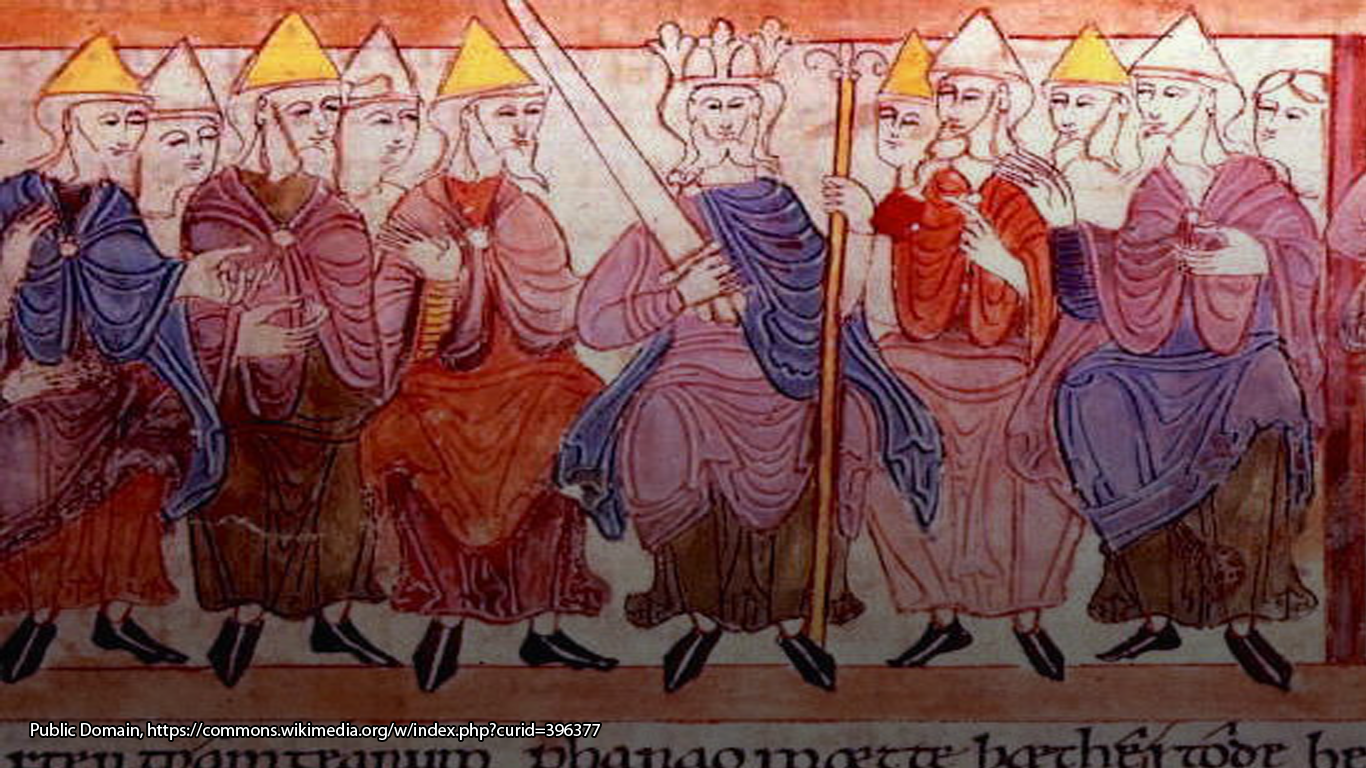

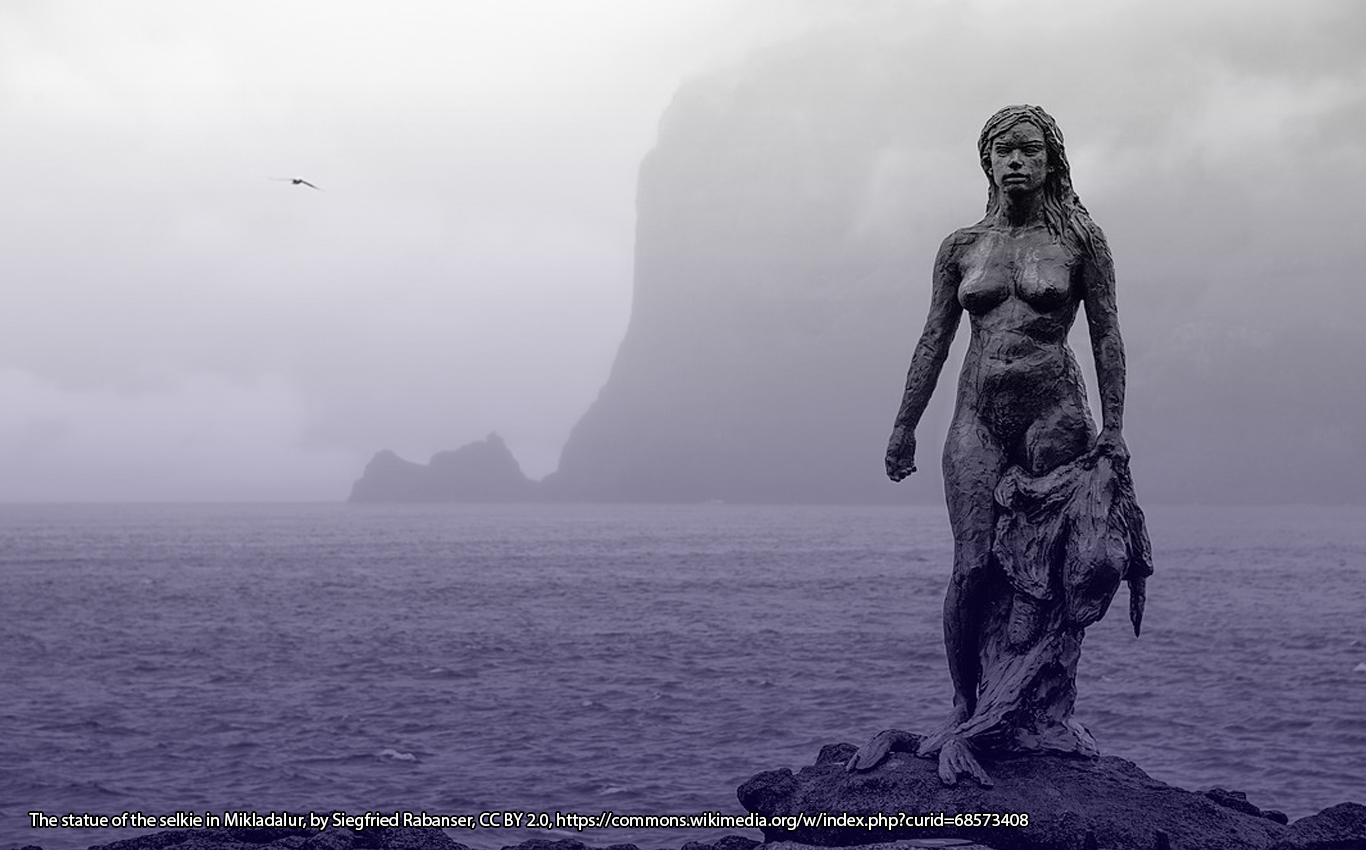


![Boadicea, leader of the rebellion against the Romans. By Joseph Martin Kronheim (1810–96)[1] - This file has been extracted from another file: Pictures of English History - Plates I to IV.jpg, Public Domain, https://commons.wikimedia.org/w/index.php?curid=12705208](https://folklorethursday.com/wp-content/uploads/2020/10/Pictures_of_English_History_Plate_IV_-_Boadicea_and_Her_Army.jpg)


